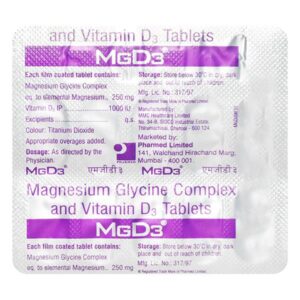MAGNESIUM + VITAMIN D3 (CHOLECALCIFEROL)
Magnesium: Magnesium is a mineral supplement that is commonly used to treat or prevent magnesium deficiency in the body. It is essential for various biological processes, including nerve and muscle function, regulation of blood pressure, and glucose metabolism. It is also involved in the production of DNA, RNA, and protein synthesis.
The main mechanism of action of magnesium is its ability to act as a cofactor for numerous enzymes in the body. It plays a crucial role in various biochemical reactions, including those involved in energy production and protein synthesis. Additionally, magnesium aids in the regulation of calcium levels in the body, which is essential for maintaining healthy bones and teeth.
The recommended dose of magnesium varies depending on the individual’s age, sex, and medical condition. Generally, the recommended daily intake for adults ranges from 310-420 mg for males and 270-320 mg for females. This can be achieved through a combination of magnesium-rich foods and supplements.
While magnesium is generally considered safe, some individuals may experience side effects. Common side effects include diarrhea, nausea, and abdominal cramping, especially when taken in high doses. Rarely, excessive magnesium intake can lead to more serious complications, such as irregular heartbeat, low blood pressure, and impaired kidney function. It is important to follow the recommended dosage and consult a healthcare professional if any concerning side effects occur.
Additionally, it is worth noting that magnesium supplements may interact with certain medications, such as antibiotics, diuretics, and muscle relaxants. Therefore, it is essential to inform your healthcare provider about all the medications you are taking before starting magnesium supplementation.
In conclusion, magnesium is a mineral supplement used to prevent or treat magnesium deficiency in the body. It plays a crucial role in various biological processes and acts as a cofactor for enzymes. While generally safe, it can cause side effects such as diarrhea and nausea. It is important to follow the recommended dosage and consult a healthcare professional if any concerning side effects occur.
Vitamin D3 (cholecalciferol): Vitamin D3, also known as cholecalciferol, is a nutrient that has several important functions in the body. It belongs to the group of fat-soluble vitamins and is naturally produced when the skin is exposed to sunlight. Vitamin D3 can also be obtained from certain foods and supplements.
The primary use of Vitamin D3 is to help the body absorb calcium and phosphorus, which are vital for maintaining healthy bones and teeth. It plays a crucial role in regulating the levels of these minerals in the blood. Vitamin D3 also supports immune function, muscle function, and the normal functioning of the nervous system.
The mechanism of action of Vitamin D3 involves converting cholecalciferol into calcitriol, the active form of vitamin D, in the body. Calcitriol then binds to vitamin D receptors in target tissues, regulating the expression of genes involved in calcium and phosphorus metabolism.
The recommended daily dose of Vitamin D3 varies depending on age, health condition, and individual needs. For adults, the typical maintenance dose ranges from 600 to 2,000 international units (IU) per day. Higher doses may be recommended for those with vitamin D deficiency or specific medical conditions.
While Vitamin D3 is generally safe when taken as directed, excessive intake can lead to vitamin D toxicity. Symptoms of toxicity may include nausea, vomiting, poor appetite, constipation, weakness, and elevated blood levels of calcium. It is important to follow the recommended dosage and consult with a healthcare professional before starting any new supplements, particularly if you have any underlying medical conditions or take other medications.
It is worth noting that Vitamin D3 is generally well-tolerated, and side effects are rare when taken within the recommended dosage range. However, if you experience any unusual or severe side effects while taking Vitamin D3, it is essential to seek medical attention promptly.

